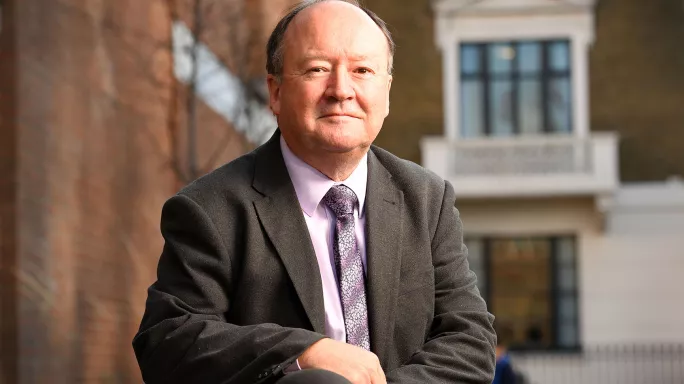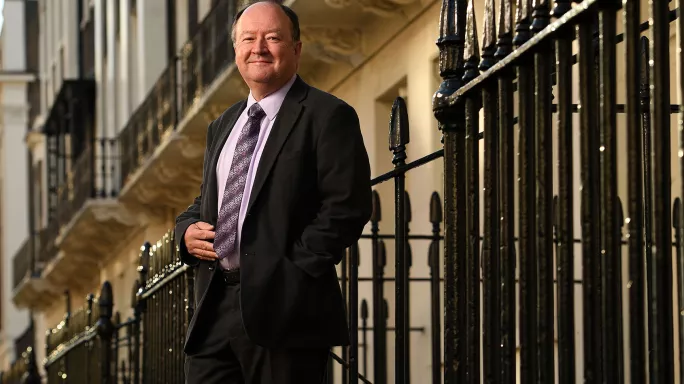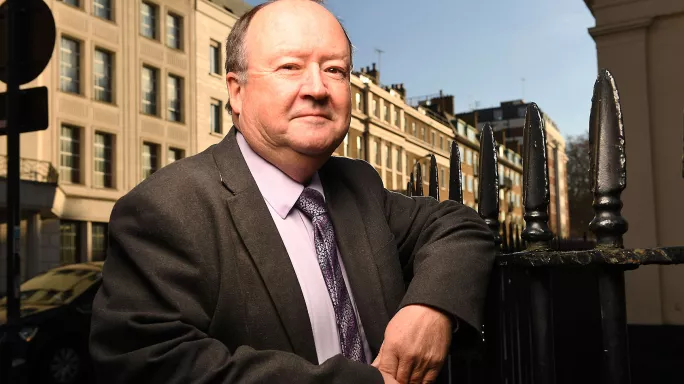- Home
- Meet the man who thinks grammar schools are the answer
Meet the man who thinks grammar schools are the answer

Jim Skinner is stuck for words when asked where he would be today if he hadn’t gone to a grammar school.
It’s a path which led him to Oxford University and into a career in education where he ended up as headteacher of an “outstanding” grammar school.
After retiring three-and-a-half years ago, he became chief executive of the Grammar School Head teachers’ Association (GSHA), where he represents the interests of 163 grammar school headteachers in England.
It’s a part-time role which includes supporting individual headteachers and being a coherent national voice for them all. Yet on this occasion he’s stuck for words.
He can’t say what would have happened if he hadn’t been up to standard on that particular day almost five decades ago when he sat his 11-plus. Although his father had a good job (as an electrical engineer), it wasn’t an option for his family to pay for a private education.
“Who knows?” he says.

“In the 60s and the 70s some of the non-selective schools weren’t giving youngsters the opportunities. Some of them wouldn’t have offered O Levels.
“And that’s one of the things that is so different today in that it’s the case that all schools are focused on helping youngsters to do as well as possible.”
Against philosophy of anti-selection
So is the grammar school system not as divisive as it once was?
Skinner admits there are “very passionate views” on both sides of the debate, but warns there is a lot of research which is “not very objective and driven by people with a philosophy of anti-selection”.
There seems hardly any need to ask whether he favoured grammar schools for his own children’s education? But he doesn’t have any children, he laughs.
Nor is Skinner married. In his spare time he enjoys gardening at his cottage in Kent, which is a hobby he’s had ever since being a teenager when he would grow plants in the greenhouse at his family home in Bromley. He later went onto studied botany at St Catherine’s College, Oxford, which isn’t a degree offered anywhere in the UK nowadays, he says.
Skinner, 59, also plays golf and watches rugby. Until last year, he was education adviser to the ill-fated Blackheath Rugby Academy, a sixth form in south-east London, which shut down after less than four years because it couldn’t recruit enough youngsters.
The academy, with just over a dozen boys in each year group, was affiliated to national league one rugby union side Blackheath FC.
“There was a growth, in the next tier up, of premiership and championship academies,” says Skinner, gloomily.
“We couldn’t compete with that system because they could offer a full range of sixth-form courses alongside the rugby.”
Does this mean he can sympathise with anti-grammar school campaigners? In other words, does he know how it feels when other schools that have more status and more to offer take away the best pupils? (Was the rugby boot was on the other foot, so to speak?)

At first he’s almost stuck for words again. “Unlike some we weren’t saying ‘we’ll turn you into a professional rugby player,’” Skinner eventually says. “What we were saying was that we’ll make you a better rugby player but we’ll also make sure you’ll get the education, which means you can go on to higher education - but other providers could provide a broader educational offer.”
Mission to help disadvantaged pupils
Skinner, you might say, has grammar schools in his blood, although the grammar school he himself attended, he says, was partly non-selective (following a merger with another school).
In his first teaching job, as a biology teacher, he opted to work in a grammar school because there was a large sixth form and therefore more scope to teach older pupils and get deeper into his subject.
And he is by no means stuck for words when stating his support for the grammar school system.
“There is little or no convincing evidence of grammar schools having a negative impact on other schools or the performance of youngsters at other schools,” he says.
“And there’s evidence that more able youngsters do better at grammar schools than youngsters of the same ability level in comprehensives.”
Skinner says a report by the Sutton Trust from 2016 is the most objective piece of research to back up his argument. And he has a copy on him.
He talks about the current 11-plus and the fact that a lot of work has been done by the GSHA and individual grammar schools (in conjunction with the two main test providers) to make tests less susceptible to “coaching” (whereby middle-class parents hire tutors to prepare pupils for admission tests).
He says he has always been “acutely aware” that the mission of grammar schools is that they provide places for pupils from disadvantaged backgrounds.
There are those who would question this is the case given that only 2 per cent of pupils at grammar schools are currently on free school meals, compared to 14 per cent nationally, although Skinner says it’s nearer 3 per cent.
But since the interview another study, from the Higher Education Policy Institute, has concluded that grammars boost poorer pupils’ chances of getting into top universities
Skinner tells the tale of a boy in foster care who had Asperger Syndrome, who went through Years 7 to 13 at Beths Grammar School in Bexley when he was headteacher.
“He ultimately went on to Cambridge to do maths,” says Skinner, proudly.
“But there were a lot of challenges along the way, including the disadvantage that he was relatively old in his year group, which meant he became 18 relatively early in Year 13, and as with a lot of youngsters in foster care, the whole system falls apart at that age.
“And we actually lost him for the second half of Year 13, so he redid the year. We worked with social services and got him back!”
First grammar head to expand
Skinner prides himself that back in 2002, in his first year as headteacher at Beths, he set up a programme working with disadvantaged primary schools, with one of its main aims being to get more disadvantaged youngsters through the 11-plus.

“We were bringing in Year 5 pupils for half-a-day a week for maths and technology, but I was by no means the only one to be doing this,” he says.
“Virtually all grammar schools would say that nowadays this type of outreach work is an important aspect.
“But one of the problems that I and others quickly realised was that it was difficult to have sufficient impact. It’s probably got to be deeper than those types of programmes.
“I remember very early on one of the heads of a primary school who was very keen to work with me said ‘don’t overestimate the impact it’s going to have because, sadly, the damage is done before they arrive with me age 5,’ and I’m pretty sure that’s word he used - damage!”
By “damage” Skinner means that pupils were already behind their peers, for example, not exposed to certain levels of vocabulary. And without realising it, he almost passes the ball to the anti-selection campaigners who argue that it’s difficult to prevent admission tests being stacked in favour of the middle classes.
In 2008, Skinner became a national leader of education (NLE), which is defined by the DfE as an “outstanding headteacher who, together with the staff in their national support school (NSS), use their skills and experience to support schools in challenging circumstances.”
In Skinner’s case, the school he supported was a big non-selective school close to Beths, which he says “went through all the Ofsted categories up to good”.
“That was in the days before multi-academy trusts (MATs), yet nowadays, in addition to NLE work, you have MATs which include both grammar and non-selective schools, which in some cases, depending on geography, share teaching staff,” says Skinner.
He’s also proud to say that Beths was one of the first grammar schools to expand (after the law changed in 2013) when it applied for cash through the government’s Condition Improvement Fund. This allowed it to create more classroom space and take on an extra 32 pupils in Year 7, many of whom were from a disadvantaged part of the borough (Thamesmead).
So what if he hadn’t passed his 11-plus some time in the academic year of 1969-70?
Skinner is an intelligent man. He is eloquent, friendly and charming, and you get the feeling he would have done all right in life.
CV
Education
Ravensbourne School for Boys, Bromley
St Catherine’s College, University of Oxford
Southampton University (PGCE)
Work
1981-91 Davenport High School for Boys (grammar), Plymouth - teacher of biology, head of biology, head of careers
1991-2002 Haberdashers’ Aske’s City Technology College, Lewisham - head of careers industrial liaison, deputy principal
2002-2015 Headteacher, Beths Grammar School, Bexley
2015-present Chief executive of the Grammar School Headteachers’ Association (GSHA)
Keep reading for just £1 per month
You've reached your limit of free articles this month. Subscribe for £1 per month for three months and get:
- Unlimited access to all Tes magazine content
- Exclusive subscriber-only stories
- Award-winning email newsletters



